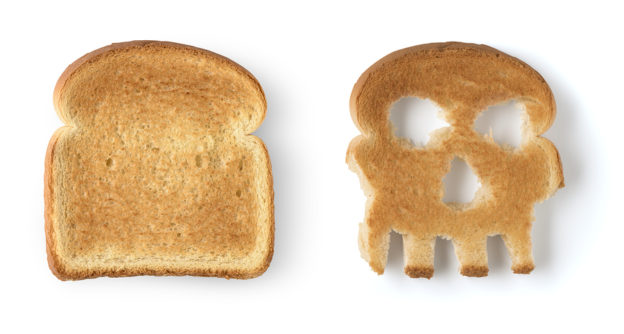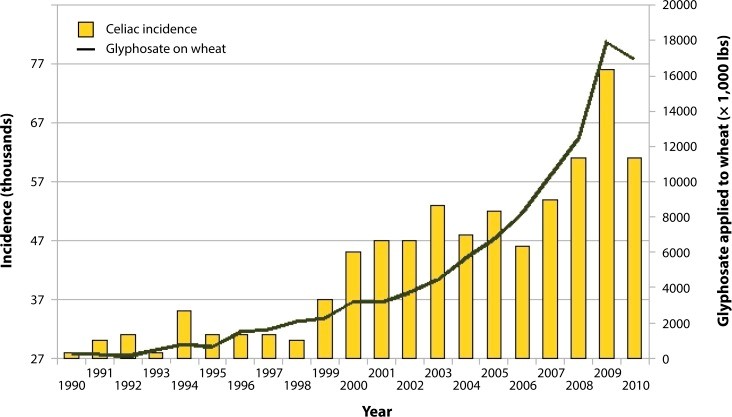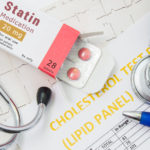By David Blyweiss, M.D., Advanced Natural Wellness
February 18, 2019
Are you still sold on the idea that whole wheat breads, cereals and pastas are the answer to good health?
I’m not. And I’ll bet your reaction this statement is the same as many of my patients.
“What the heck, Doc,” they say. “My ancestors ate wheat all the time. What’s your problem?”
It’s not ‘my’ problem. It’s everyone’s.
Today’s whole grains aren’t anything like the ones your ancestors ate!
They’ve been scientifically engineered and hybridized. And most of them contain gluten.
I’m sure you’ve heard of gluten before. It’s a protein that can trigger inflammation – an underlying factor in so many chronic diseases like joint and bowel disorders, heart disease and other health problems.
And here’s an interesting little tidbit.
Cases of gluten intolerance, celiac disease, irritable bowl syndrome and other health issues have skyrocketed since the modernization of wheat. In fact, celiac disease alone is at least four times more common today than it was 60 years ago.
That’s because today’s wheat hasn’t just been re-engineered and modernized. It’s also frequently sprayed with toxic chemicals like glyphosate, the poison in Roundup that kills weeds.
Yes. That’s right.
The World's Quickest Solution for Ending Prostate and Urinary Misery
This has recently been revealed to be one of the only real breakthroughs in prostate health.
The seeds of a strange fruit (sometimes called "Chinese Apples") hold powerful phytonutrients that are a revolution in prostate health.
In fact, UCLA and Veterans Administration research have now proved this to be true.
Not only that, but it may be the worlds quickest solution for ending prostate misery.
Simply stated, these phytonutrients represent a huge step beyond beta sitosterol, saw palmetto, and other phytosterols alone.
Simply click HERE if you want to have fast prostate relief...restful, uninterrupted sleep...no more constant "urges to go"...enhanced virility...and optimal prostate support for life.
Farmers here in the U.S. often drench their wheat crops in glyphosate a week or two before harvest. This is a quick and easy way for them to dry the wheat out. It also leaves high residual levels of glyphosate in the wheat used to make the breads, cereals and pastas you eat.
And today there is plenty of evidence that glyphosate might just be fueling gluten intolerance and celiac disease.
Here are just a few ways glyphosate can affect your health:
- It destroys healthy strains of bifidobacteriaand lactobacillus. These two types of bacteria are necessary to modify gluten in a way that makes it less allergenic. When glyphosate depletes them, highly allergenic gluten fragments are free to wreak havoc on your body and digestive tract.
- At the same time, glyphosate promotes an overgrowth of some very nasty and unhealthy bacteria, like coliand c. difficile. Both of these can greatly add to intestinal distress, nausea, abdominal pain and severe diarrhea.
- Glyphosate disrupts certain liver enzymes that impair your ability to process fats in the gut. That only adds to the gluten-related digestive complaints that may plague you.
- Additionally, it impairs your body’s ability to detoxify itself. This means it can cause the toxic load in your body to build up over time. Eventually, the accumulation of toxins may reach a tipping point.
How to Get Off of the Whole-Wheat
and Gluten/Glyphosate Merry-Go-Round
If you have celiac disease, IBD or are diagnosed gluten intolerant, steer clear of any foods that contain wheat, spelt, kamut, barley, semolina, durum or rye. You should also avoid oats. (Oats don’t contain gluten, but are often contaminated with gluten in the field or during storage or processing.)
You can use amaranth, buckwheat, millet and quinoa products as healthier alternatives.
If you’re still a whole wheat believer and don’t want to give them up, check out Non-GMO Project Verified breads and pastas. These foods will cost a little more, but they won’t contain toxic glyphosate.
At the same time, it’s important to watch out for other glyphosate-laden foods. Products that include any type of corn or soy fall into this category. This includes foods containing high fructose corn syrup, corn meal, corn oil, soybean oil, soy lecithin and other “corn” or “soy” related ingredients.
I also recommend taking a probiotic to restore a naturally-healthy balance to your gut microbiota… especially if you’ve been eating a lot of whole wheat products.
Look for a formula that contains bifidobacteria, lactobacillus and other strains of healthy bacteria. The higher the colony count, and the more live strains involved, the better off you’ll be. Just make sure to take it daily.
SOURCES:
Rubio-Tapia A, et al. Increased prevalence and mortality in undiagnosed celiac disease. Gastroenterology. 2009 Jul;137(1):88-93.
Samsel A, et al. “Glyphosate, pathways to modern diseases II: Celiac sprue and gluten intolerance.” Interdiscip Toxicol. 2013 Dec;6(4):159-184.







